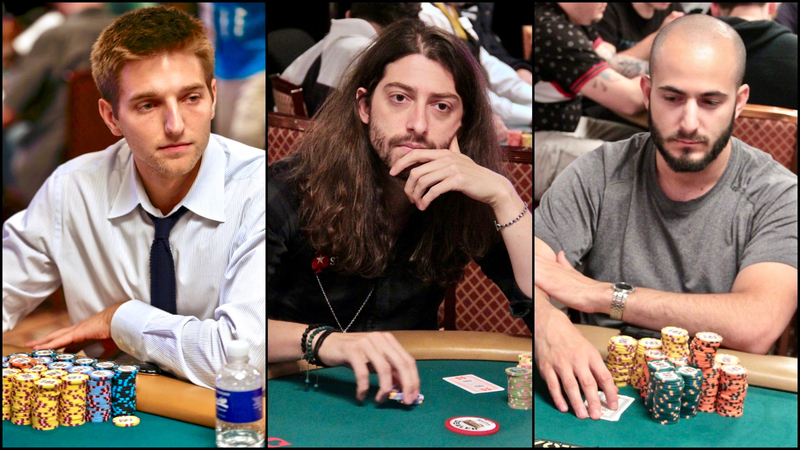
Benefits: Tony Dunst, Igor Kurganov, and Brian Altman
Craig Tapscott: What are some of the major challenges you have faced in the past when traveling from city to city around the world (before COVID) do you play poker?
Tony Dunst: simple as jet lag. It's really hard for me to play patience 10 plus hours of live poker if I'm not well rested, and the older I get, the harder it is for me to quickly adjust my internal clock. Even the transition from West Coast to East Coast for the tournament is difficult as the events suddenly begin as our internal clock expects to continue to sleep. Of course, this becomes more apparent when you start talking about flying over the oceans and try to shift your entire schedule by a few hours.
I believe it takes about a week of this size to fully adjust to a change, and for the first few days I usually hardly sleep and often feel sick with my stomach. If I can get somewhere early and give myself time to harmonize I will, but this option is not always available. It is quite common for a large event to occur within a day or two of landing.
The next major challenge is dealing with the traditional banking system, which I am glad is slowly becoming obsolete. Not only does it usually take a long time to figure out how and where you will send money, it's normal to have to jump through hoops with your own bank to send or withdraw large amounts. Additionally, you will likely have trouble converting the currency.
It is common for transfers to be rejected or returned due to a small discrepancy in the completed form, and this can leave your funds suspended for several days. I have even been to places where the local government does not allow you to take money out of the country, and the local converters do not have cash on hand to exchange (and I'm not talking about large sums here). Once everything is reopened, I can't wait to be able to travel the perimeter without carrying cash or sending wires, and I just use cryptocurrency to organize the necessary funds at any local casino I play at.

It's hard to develop good habits if you can't make them, well, habits. Things just don't go well when they're not part of the routine. Overall, I have a bit more control over my mornings than other parts of the day, but that only takes it this far.
One more thing that is a bit tricky is that as a professional poker player, you are a sole trader. Logistics, administrative and accounting tasks take a lot of time beyond what you spend at the table. In practice, this meant that I chose urgent priorities most of the time and had difficulty reaching items on my "important but not sudden" list.
Brian Altman: Traveling from town to town while playing poker all over the world takes its toll on your body. One of the biggest challenges for me was maintaining a healthy routine while traveling. A few years ago, I started to prioritize sleep. In my youth, I was up late and would not quit the game of poker if it was good. I've always had a long term approach to poker, so all-night marathons are not something that I consider to be sustainable. Now, I am much more disciplined in keeping a regular sleep schedule, not only on the go, but in my daily life.
Another thing that I include in my road routine is weight-resistance training. I have access to a gym most of the time, but if I don't, I will do some bodyweight exercises like push-ups. Even a short workout in the morning sets the tone for the rest of the day.
A healthy diet is also very important to me. Many of the poker stops on my schedule are places I have already visited, so I already know the dining options. I am a being of habit and tend to eat the same food in the same places. If I can improve my decisions about what to eat, I can focus on the more important decisions at the poker table.
Ultimately, taking care of your bodies translates to clearer thinking at the poker table which translates into better decision making. Poker players may not be viewed with the same lens as professional athletes, but we can certainly learn and follow the measures they take to prepare for a competition.
Craig Tapscott: The past year has been very difficult due to pandemic, isolation and blockades. Can you tell a bit about your challenges over the past year, or maybe share an experience or a relationship that has developed over the past year because of this change that has added value to your life, and perhaps to your game?

I wouldn't say that any relationship "developed" over the past year, but the person I spent a lot of time talking to and learning with was Andrew "Luckychewy" Lichtenberger, who was arguably the most influential person on my progress as a player over the course of the last year. last 15 years. At this point, I consider Chewy a friend, mentor and enemy. 1 because I really think he's the best (in our regular player pool) and you can't be the best until you beat the best. He's been performing well for over a decade, but I think he's going to really explode in the next few years, and I love seeing the success his work ethic brings him.
Igor Kurganov: To be honest, COVID it did not radically change my approach to professional poker, at least in the beginning, mainly because before the pandemic started, I had significantly reduced my travel frequency. I think the amount of time people were forced to stay at home actually increased the interest in online poker, with many games added in March and April last year, and playing large-scale was easier than usual.
To some extent, however, I believe that COVID

I've been gradually increasing the amount of time I've been working on for some time REG

Brian Altman: Before the first wave of restrictions last March, I was jumping the West Coast playing several tournaments. I arrived in Vegas a few weeks early to attend the World Poker Tour delayed final table and play in a few other tournaments. As things started to unfold, the events were canceled and I realized I could stay in Vegas much longer than I expected. Fortunately, I was in comfortable accommodation and had everything I needed. The original three weeks turned into a five-month stay.
At that time, I switched to an online game. I have a lot of experience playing online as that was how I initially got involved in poker, but for the last decade or so, most of my game has been played in person. The online landscape is completely different now than it was before Black Friday. Training tools and learning resources are plentiful. Online players are more knowledgeable and technical than live players, so leaks in your game show up much faster. I used this time as an opportunity to improve as a player through fun and learning.
I am a very independent person but the isolation aspect at the time was quite difficult. However, regular contact with friends and family via Facetime and Zoom helped to soften the experience. Listening to podcasts, going for daily walks, and having a consistent online poker schedule gave me some structure to my days and helped me feel productive.
After a year, I have more appreciation for live poker - a long pause and look forward to playing more in the future. As more and more states inevitably adopt regulated online poker, I hope to find a good balance between online and live. ♠
Tony Dunst is a two-time World Series of Poker bracelet winner and World Poker Tour Main Event Champion with $ 4.1 million in career earnings from live tournaments. A native of Wisconsin has joined the broadcast WPT Team 2010 as host of the Raw Deal segment, eventually moving into the commentary position to replace Mike Sexton alongside Vince Van Patten.
Igor Kurganov is not. # 1 in Russia's all-time list of poker money with $029.5 million in live-earning tournaments. The high-roller crusher is the champion of the European Poker Tour and has won WSOP bracelet with his girlfriend and poker mate Liv Boeree. Kurganov co-founded Raising for Effective Giving, an organization that educates poker players about altruism and fundraising for select charities. Since 2010, 

Brian Altman became the first player to ever win the same WPT twice in the main event, beating the Lucky Hearts Poker Open in both 2015 and 2020. As a result of his impressive touring performance, he was crowned WPT Player of the Year. The Massachusetts native earned over $ 4.5 million in live tournaments.

